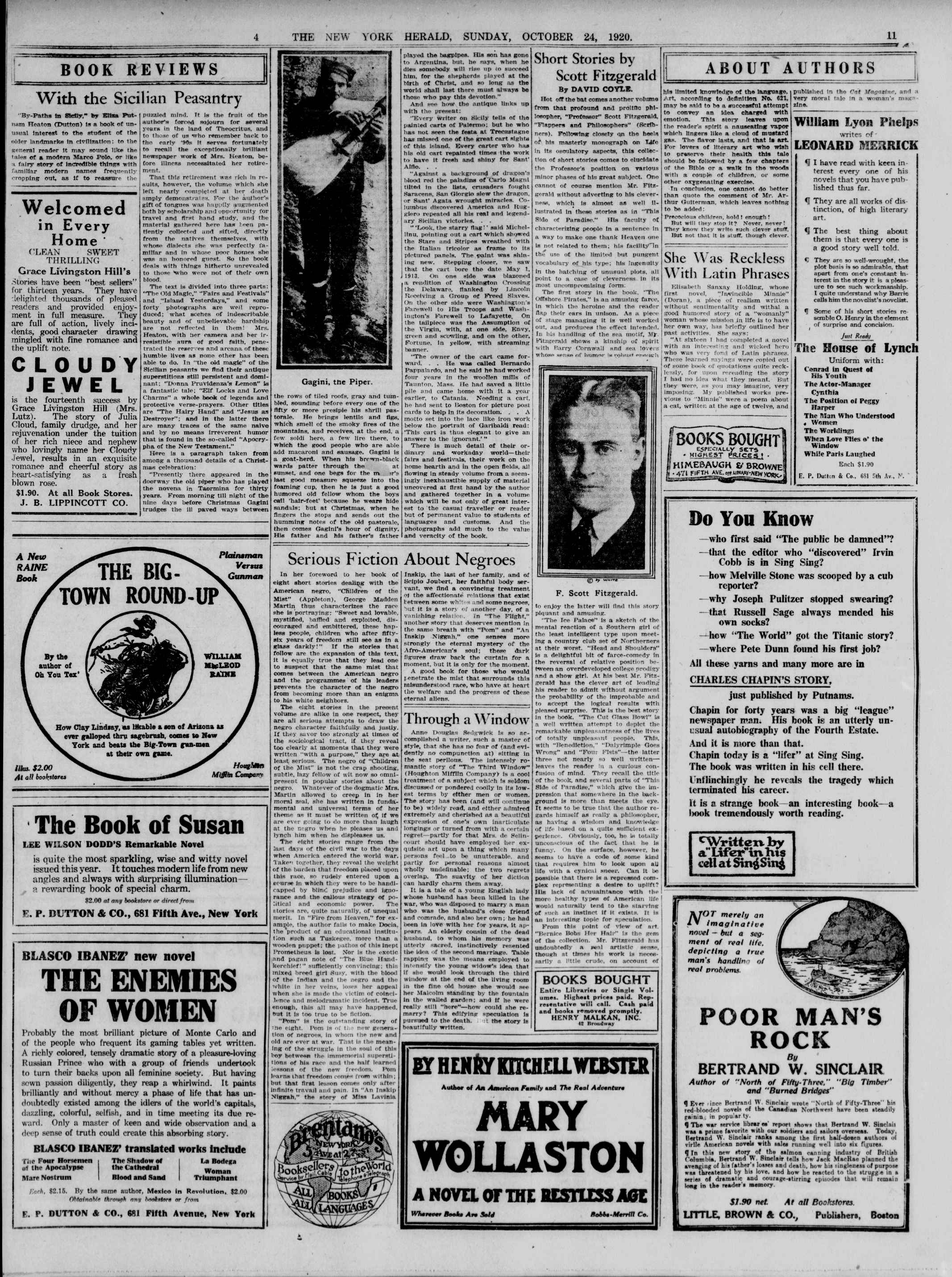
Short Stories by Scott Fitzgerald
by David Coyle
Hot off the bat comes another volume from that profound and proline philosopher, “Professor” Scott Fitzgerald, “Flappers and Philosophers” (Scribners). Following closely the heels of his masterly monograph on Life in its oscillatory aspects, this collection of short stories comes to elucidate the Professor's position on various minor phases of his great subject. One cannot of course mention Mr. Fitzgerald without adverting to his clever- ness, which is almost as well illustrated in those stories as in “This Side of Paradise.” His faculty of characterizing people in a sentence in a way to make one thank Heaven one is not related to them; his facility in the use of the limited but pungent vocabulary of his type; his ingenuity in the hatching of unusual plots, all point to a case of cleverness in its most uncompromising form.
The first story in the book, “The Offshore Pirates,” is an amusing farce, in which the heroine and the reader flap their ears in unison. As a piece of stage managing It Is well worked out, and produces the effect Intended. In his handling of the sea motif, Mr Fitzgerald shows a kinship of spirit with Barry Cornwall and sea lovers whose sense of humor is robust enough to enjoy the latter will find this story piquant and amusing.
“The Ice Palace” is a sketch of the mental reaction of a Southern girl of the least intelligent type upon meeting a country club set of Northerners at their worst. “Head and Shoulders” is a delightful bit of farce-comedy in the reversal of relative position between an overdeveloped college prodigy and a showgirl. At his best Mr. Fitzgerald has the clever art of lending his reader to admit without argument the probability of the improbable and to accept the logical results with pleased surprise. This is the best story in the book. “The Cut-Glass Bowl” is a well written attempt to depict the remarkable unpleasantness of the lives of totally unpleasant people. This, with “Benediction,” “Dalyrimple Goes Wrong” and “Four Fists”—the latter three not nearly so well written-leaves the reader in a curious confusion of mind. They recall the title of the book, and several parts of “This Side of Paradise,” which give the impression that somewhere in the background is more than meets the eye. It seems to be true that the author regards himself as really a philosopher, as having a wisdom and knowledge of life based on a quite sufficient experience. Obviously, too, he is totally unconscious of the fact that he is funny. On the surface, however, he seems to have a code of some kind that requires him to look upon all life with a cynical sneer. Can it be possible that there is a repressed complex representing a desire to uplift? Ills lack of acquaintance with the more healthy types of American life would naturally tend to the starving of such an instinct if it exists. It is an interesting topic for speculation.
From this point of view of art “Bernice Bobs Her Hair” is the gem of the collection. Mr. Fitzgerald has undoubtedly a real artistic sense, though at times his work is necessarily a little crude, on account of his limited knowledge of the language. Art, according to definition No. 621, may be said to be a successful attempt to convey an idea charged with emotion. This story leaves upon the reader's spirit a nauseating vapor which lingers like a cloud of mustard gas. The flavor lasts, and that is art. For lovers of literary art who wish to preserve their health this tale should be followed by a few chapters of the Bible or a walk in the woods with a couple of children, or some other oxygenating exercise.
In conclusion, one cannot do better than quote the comment of Mr. Arthur Gutterman, which leaves nothing to be added:
Precocious children, hold! enough!
But will they stop it? Never, never!
They know they write such clever stuff.
But not that it is stuff, though clever.
Published in The New York Herald newspaper (Sunday, October 24, 1920).
